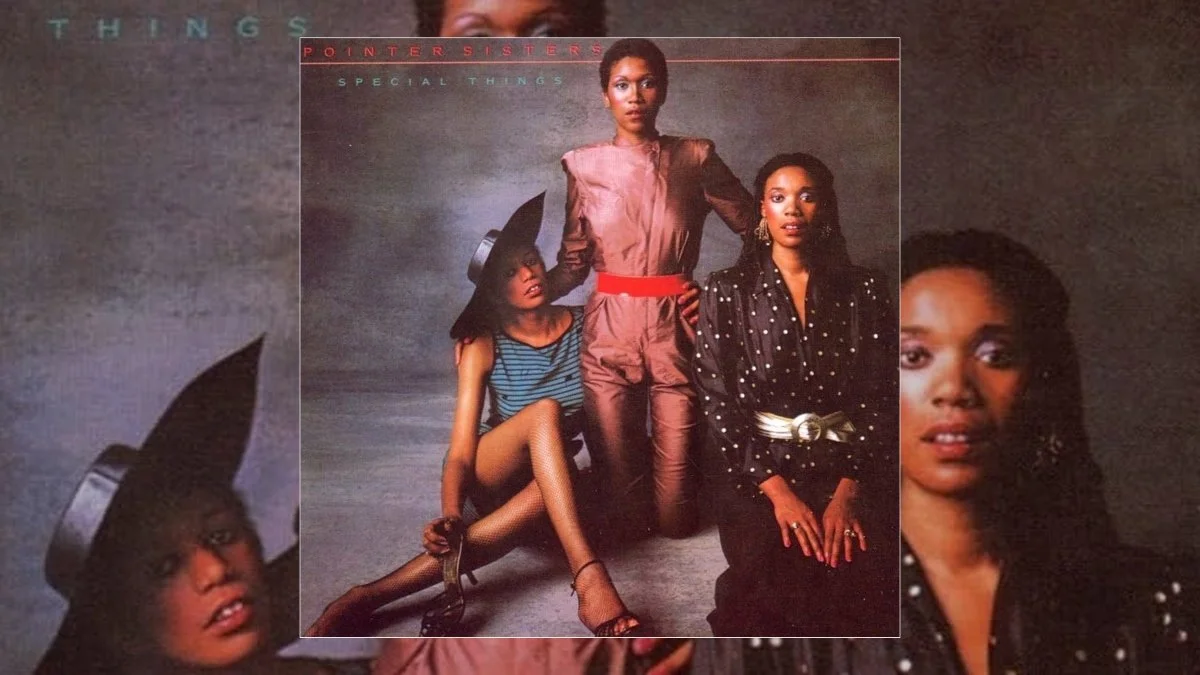Happy 45th Anniversary to the Pointer Sisters’ seventh studio album Special Things, originally released August 1, 1980.
When Special Things was released in August of 1980, it didn’t arrive with the seismic jolt of a blockbuster or the breathless acclaim of a reinvention. It wasn’t trying to outdo Break Out (1983), which hadn’t yet happened or recapture the genre-hopping eclecticism of the Sisters’ early ‘70s work. And yet, listening to it now, 45 years on, there’s something quietly radical about its poise. Not because of where it landed on the charts, but because of what it quietly, confidently achieved: a musical recalibration that refined who the Pointer Sisters were and who they were about to become.
By this point, Anita, Ruth and June Pointer were no strangers to reinvention. They had spent the better part of a decade reshaping the idea of what a female vocal group could sound like, cycling through bebop, country, jazz, funk, and R&B without ever sounding uncertain. That genre agility had become a kind of signature. But Special Things signaled a shift, not a break from the past, but a honing in. Gone were the big-band references and theatrical quirks. What replaced them was leaner, cooler, and far more locked in: a modern, groove-based sound that flirted with the mainstream without surrendering to it.
“Could I Be Dreamin’” opens the album with exactly that kind of balance. There’s a sensual undercurrent to it, but it’s understated, and most definitely refined. The harmonies land softly, never overselling, while Richard Perry’s production stays out of the way, framing the song like a portrait rather than smothering it in gloss. It’s a declaration of intent, though a quiet one: this was a new chapter, and it didn’t need to shout.
Of course, Special Things is best known for its standout single “He’s So Shy.” On paper, it’s a breezy pop track, a sparkling confection tailor-made for radio. But in execution, it’s something richer. June’s vocal, playful and nervy, dances on the edge of infatuation without tipping into melodrama. There’s a youthful giddiness there, but it’s never naive. What the Pointer Sisters do, what they’ve always done, is take familiar pop tropes and smuggle in emotional intelligence. “He’s So Shy” isn’t just about a crush; it’s about vulnerability, restraint, and all the things we don’t say when desire makes us clumsy. That it became a hit is no surprise. That it still feels fresh is the real triumph.
Elsewhere, the album deepens rather than broadens. “The Love Too Good to Last,” written by Peter Allen, Burt Bacharach and Carole Bayer Sager, is a standout not just for its pedigree, but for how seamlessly it fits into the Sisters’ world. The arrangement aches without collapsing into sentimentality, and the vocal delivery is measured, adult, quietly bruised. This is love after experience, not after innocence.
Listen to the Album:
Similarly, “Where Did the Time Go” treads even more introspective ground, unfurling like a memory you’re trying to hold onto before it disappears. Anita’s voice leads with a kind of weary grace, offering reflection instead of confession.
There’s a different energy on tracks like “Movin’ On” and “We’ve Got The Power.” Here, the groove takes center stage, but again, nothing is overplayed. The rhythms are tight, the basslines muscular, but the restraint remains. These songs feel like precursors to the funk-pop hybrids that would define the mid-‘80s, but without the ego. There’s joy in them, yes, but it’s a joy that’s earned, not manufactured.
The album’s closer “Here Is Where Your Love Belongs” isn’t a showstopper and it doesn’t need to be. There’s no grand crescendo, no push for closure. It just...lands. Gently. With the same quiet control that runs through the rest of Special Things. In choosing restraint over resolution, the song becomes a final, understated gesture and one of many subtle choices that give the album its elegance, its precision, and its lasting resonance. (Note: While “Movin’ On” appears as the final track on the 2010 remaster. “Here Is Where Your Love Belongs” closed the 1980 release, and remains the emotional curtain call of the record.)
Richard Perry’s influence here can’t be overstated, but it’s also never overbearing. He gives the songs shape and sheen, yes, but more importantly, he listens. He leaves space for the Pointer Sisters to breathe, to phrase, to color a line the way only they can. There’s a spaciousness to the production, a sense that every element is there for a reason. Nothing is ornamental. Everything serves the song.
What’s most remarkable about Special Things, though, is what it manages to hold together: the past and the future, polish and feeling, mainstream accessibility and artistic integrity. It doesn’t carry the political edge of their early work, and it doesn’t chase the anthemic highs of Break Out. Instead, it offers something subtler and, arguably, more enduring: a snapshot of a group finding their footing not through reinvention, but through refinement.
Forty-five years later, in a world drowning in algorithmic playlists and performative nostalgia, Special Things still has the ability to disarm. It doesn’t pander, and it doesn’t beg for rediscovery. Instead, it rewards attention quietly, patiently. It invites you in, then surprises you with how much is going on beneath the surface. In many ways, it’s one of the Pointer Sisters’ most honest records, not because of what it says, but because of how assuredly it says it.
One of the most beautiful aspects about Special Things is that it doesn’t need to be the loudest or the boldest to be among their best. It just had to be itself. And 45 years on, that’s more than enough.
Listen:

